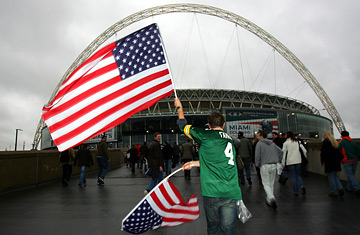
Fans arrive to watch the New York Giants play the Miami Dolphins at Wembley Stadium, in London on Sunday, October 28, 2007.
Neither the driving rain nor the lackluster play could douse the enthusiasm at London's Wembley Stadium on Sunday, where the New York Giants edged the winless Miami Dolphins, 13-10, in the first NFL regular-season game played outside the Americas. American football has touched down across the Atlantic — and it brought its penchant for pageantry along with it. A 26-foot animatronic version of Jason Taylor, the Dolphins standout defensive end, stood sentry over the parking lot as a capacity crowd of 81,176 streamed in. Fireworks punctuated player introductions, and a pop band performed at midfield before a ceremonial coin toss. Flashbulbs popped incessantly, lighting the stands like a strobe. The game was sloppy, but the spectacle impressed.
Splashy entrances aside, the NFL is a bit late to the party: it's the third major American sport to bat its eyes at the British capital in the past month. An Oct. 10 NBA clash between the Boston Celtics and Minnesota Timberwolves at London's O2 Arena (formerly known as the Millennium Dome) was the showcase match-up in a five-city, seven-game European tour. On Sept. 29 and 30, that newly rechristened venue also played host to a season-opening two-game series between the Los Angeles Kings and Anaheim Ducks of the NHL, a league whose fan base is rapidly eroding at home.
In a sort of reverse Manifest Destiny, American sports leagues are looking east to grow, and have zeroed in on Europe as a fertile frontier. "You can play the music and buy the CD, but the band has to tour occasionally," NBA Commissioner David Stern told TIME. "This is a way of cementing our connection with the fans."
And with those fans' wallets. London, a global financial hub and the host of the 2012 Olympic Games, is an increasingly vital part of any global strategy. The NBA opened its European headquarters here in July. The success of Sunday's game suggests the plan has promise. But numerous sports are vying for Europe, and the NFL lags behind in the scramble for territory.
Though enormously successful at home, the league has yet to find an effective formula worldwide. Foreign markets account for less than 5% of the nearly $7 billion in annual revenues the NFL takes in. Last October, NFL team owners approved a resolution enabling the league to stage up to two international regular-season games per year through 2011. Sunday's game comes two years after the NFL's first international regular-season contest, in Mexico City, which drew a league-record crowd of 103,000. That event's success has spurred a more than 20% annual increase in revenue derived from Mexico since then, which is slated as a future international game destination, along with the UK, Germany, and Canada.
The lucrative example both the NFL and NBA hope to emulate is the English Premier League, the world's most profitable soccer division. Like the NFL and NBA, the Premiership enjoys tremendous domestic support — league-wide attendance averaged 92% in 2006-2007. But it's the Premier League's global expansion model that has rivals drooling. "It wouldn't surprise me if one of the things that may have caught the eye of the U.S. sports is the massive increase in value of overseas rights deals," says Alex Byars, a senior manager in the sports business group at Deloitte, the business advisory firm. Under a new international broadcast rights agreement, Byars says, the Premiership will earn an average of nearly $430 million each of the next three years, nearly double the annual amount it pulled in under a previous agreement.
Still, in a nation where every touch of boot to ball carries cataclysmic importance, "For any sport to try and successfully enter the market and build a large and sustainable fan base would be incredibly difficult," says Simon Chadwick, professor and director of the Birkbeck Sport Business Centre at the University of London. That won't deter them from trying. The NBA, which in 2006 plucked its top draft pick from Italy and featured 2007 regular-season and Finals MVPs from Germany and France, can "absolutely" grow to rival soccer's popularity in Europe, says Heidi Ueberroth, president of global marketing partnerships and international business operations. The league derives 10% of its revenue from foreign markets, and basketball is already the third most-played team sport in Britain, and the second for under-18s. "I've been around long enough to see when the stars are coming into alignment," the NBA's Stern said. "We're not there yet, but I'm beginning to sense it."
The NFL's plans for Europe aim at elevating the league to a similar level. But part of the mission Sunday was merely briefing prospective fans on the game's nuances. A recurring segment during television timeouts explained the finer points of the game — how to crouch in a three-point stance, for instance. Exuberance may have trumped insight among the crowd, but that shouldn't dim the league's optimism. Rather, it underlines the potential for growth.
